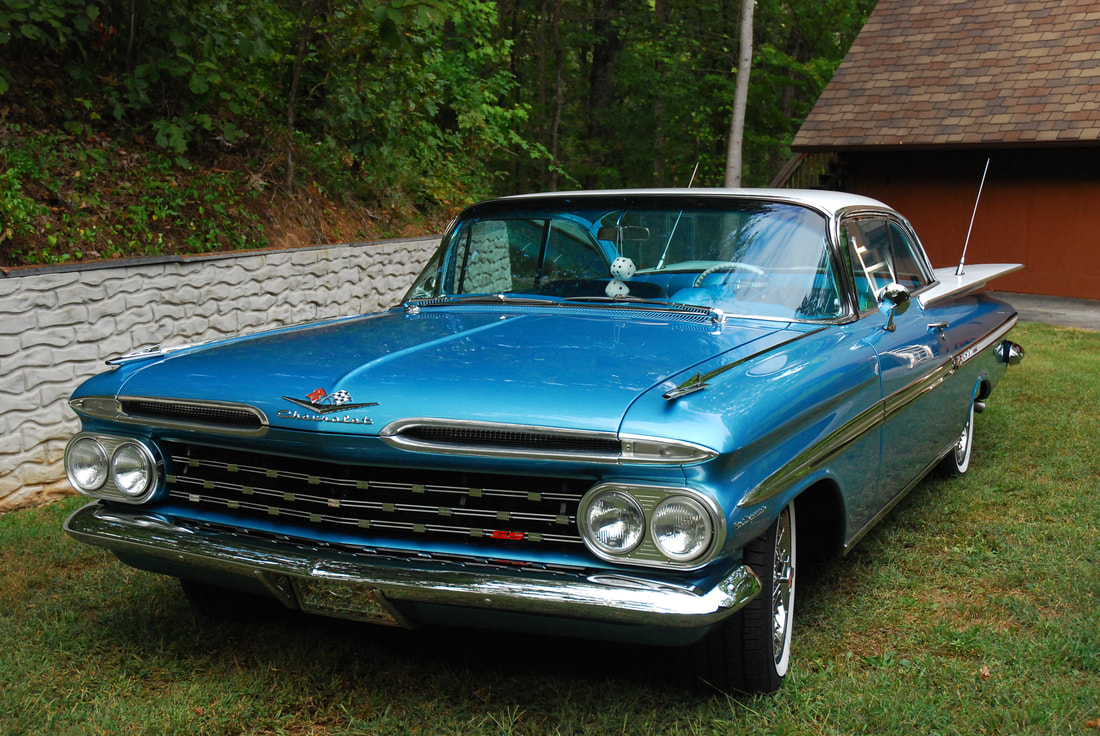 The '59 Impala my father restored before they moved to Florida. The '59 Impala my father restored before they moved to Florida. My first memory is of sitting between my father and the fuel tank of his 1969 Triumph Bonneville motorcycle as we rode around the backyard of our suburban, Maryland home. Cars and motorcycles featured heavily in my formative years. My father was an auto mechanic, and later, Service Manager, at an Oldsmobile dealership. Some days my mother would take myself and my sister and meet my dad for lunch and I would marvel at the cars up on lifts, their wheels dangling in the air, the sounds of air tools echoing through the shop. Dad was never embarrassed by his blue collar roots. In fact, he used to say, "sure put a lot of steaks on our table." The fact we came from blue collar stock on both sides of the family (my paternal great grandfather drove a switch engine for the Illinois Central Railroad, and my maternal grandfather was a body and paint man) might have been a part of this, but I also think blue collar workers were more respected in those days. When I was around 12 or maybe 13, my dad decided we should look for a car to restore for when I turned 16. During one of our fruitless searches to see some "rust free" car (which usually turned out to be more rust and dents than car), we passed a house where he knew a 1961 Chevy Impala lived. "Hey, want to see the first car I ever bought new?" my dad asked as we turned into the driveway. The car under the cover turned out not to be the car he'd seen at the house, but it was a '61 Impala nonetheless. The man who answered the door said we could pull the cover off to look at the car, and "oh, by the way, it's for sale." Like a little boy, my father made laps around the car, getting slower and slower as he looked more closely at his find. Soon, a call was made to my mother who then drove up with the checkbook in hand, A price was agreed upon and we had our first car to restore. It wasn't for me for when I turned 16 (though I did later own the car for a time), but I did spend a good bit of time helping to work on it. My dad was a pretty damned good father. He played with us, taught us the value of hard work, to respect the things we had, and to love (something he regularly displayed as it came to my mom, never failing to compliment how she looked, and pretty much everything she did). Mom was a hard working "stay at home" mom, something the world is sorely lacking these days. There was never any doubt what she did at home was at least as valuable a contribution as what dad did at work. And when dad came home, he did a lot around the house, as well. Whether it be keeping up with the lawn, repairing some piece of plumbing, or ripping the roof of our house and adding a second story, he and mom worked hard. Maybe that's why we respected our stuff; we all knew the work that bought or built it. And now I sit as my mom sleeps in her rocking chair, holding my dad's hand as he rocks and watches TV. He works hard to take care of her. Sometimes he gets frustrated, and frequently his back is killing him, but he does everything he can for her. Maybe more.  Good morning!! It's sunny and 76° here in redneck heaven (Harriman, Tennessee). Much water has passed under the bridge since we last left my silly build. I am proud to say, the thing still runs strong as ever, though some of the peripherals have fallen into disrepair. Mostly, the never redone bits have continued to age. In the meantime, my mother has been diagnosed with PSP (Progressive Supranuclear Palsy). Essentially, this is a 3 to 6 year death sentence where her brain slowly dies. It's been absolute hell on my father, and much of my time has been spent traveling back and forth to Florida in my '03 Miata. I take a back way, so the trip is as enjoyable as possible (though I'm starting to memorize much of the 600-and-some mile trip. Nonetheless, it's time to get some stuff done, but please understand, this thread might have fits and starts and periods of no activity. A quick rundown of where we stand and where we're headed: Currently, it runs great and shifts great. An inspection of the underbody reveals no rust, and, if the one body bolt I pulled can be trusted, even the body mounts and hardware are in good shape. It currently has 3:whatever a stock Wagoneer comes with, with tires which are too tall for the gearing. Body is in great shape, with no rust and minimal damage. Power windows don't. Dash needs a rethink Plans: Chassis
Body
Interior
 I have a confession to make; I had a great childhood. I know as an author people expect some huge trauma or some other disaster to mark a childhood capable of producing the sort of introspective tidbits which are the writer's fodder, but the truth is; there really weren't any. I grew up in a suburb of Washington DC called Wheaton, in the state of confusion... Sorry, I mean, Maryland. We (my sister and I) had lots of friends in the neighborhood, played in the various backyards, caught fireflies in the summer and played in the snow in the winter. Through the years my parents worked hard to provide not only the staples needed for our health and growth, but also a good number of luxuries which brought the kids to our yard to play. Among these were a huge swing set, a 4'x8' covered sandbox, and a series of above ground and then in-ground swimming pools. The truth is, I suppose, my sister and I were spoiled. Yet, somehow not. We never thought ourselves superior, richer, or in any way better than those on the block who didn't have these things. In fact, we couldn't wait to share them with our friends. This was even true as we became teens, and our friends would come over to "hang out" in the pool, on the back porch, in the living room, or the garage. Me and my fellow friends tended to be "car guys." It was a bit natural, I suppose, as my father was a hard working auto mechanic, first at a local Oldsmobile dealership, and then at a service station he purchased. Over the years we built many a car in our backyard garage, beginning with my uncle's '72 Pontiac LeMans and '72 Oldsmobile Cutlass, through a series of old Chevys including a '61 Impala, '66 Chevelle convertible, '61 Corvette, and a '57 BelAir my father built my mother as a 25th anniversary gift. Some of my fondest memories were walking through Leon's Junkyard in Leon, Virginia. The smell of cow manure features prominently in these memories as, at least for the first few years we made our several times a year pilgrimages to Leon's, there were cows grazing in the yard. Let me tell you; it's something to be working under the hood of a car and see a cow come up in your peripheral vision! My sister didn't have (get?) to build her car, but my parents did buy her one. Still, though both of our cars were paid for by my folks, they somehow managed to instill a sense of responsibility for both the value of the car and the destructive power of 4,000 pounds of iron and steel. Neither of us wrecked our car or got a ticket during our formative driving years. But the river of time flows rapidly, washing us downstream into the eddies and undertows which define life. My parents are now around 80. Both my folks smoked for years, and now both have COPD. They manage, but it is disheartening to see what such a stupid little habit has done to them. Yet, they also somehow managed to impress upon both my sister and I that smoking was a stupid habit. Neither of us ever did take up the habit, though I have smoked twice in my life, with both times being the result of my having set an article of clothing on fire. The real issue, however, is with my mom. Progressive Supranuclear Palsy, or PSP. It's a "Parkinsonsism" which, apparently, means it's not really related to Parkinson's Disease at all. It is a progressive neurological disease which, like so many such diseases, steals the sufferer away from themselves and their family. Three years ago they moved to their final retirement home in The Villages, Florida, where they wanted to take full advantage of all the games, concerts, and other amenities that sprawling retirement community has to offer. They had a house built to their specifications, and my mom picked out the colors, cabinets, and decorations throughout. The future, their "golden years" looked assured and filled with love and fun. We got the love part right. By the end of their first year in Florida, my mom was showing serious signs of this new disease. Confusion, an inability to monitor her own medications, and a stiff gait were all early symptoms. But PSP is a fast-moving disease. Today, a mere three years after they moved in, my mother is wheelchair bound, has bouts of severe agitation where she cannot sit still, calls out for long deceased relatives, and questions whether the place they are living is actually their home. On good days, these symptoms only appear late in the evening, and are explained by the term "sundowning." On bad days, the entire day will be comprised of trying to keep her calm with a steady diet of walks, sitting outside on the porch, and CBD gummies. Sometimes it all works; sometimes it doesn't. My sister, God bless her, lives about an hour from my parents. She and her husband have been a Godsend, taking my parents to appointments, ensuring their medicine containers are filled, and their fridge is stocked with the sort of foods an overwhelmed man and his PSP-suffering wife can easily cook and eat. I, of course, do my part as well, making trips south whenever needed. This is easier said than done as my wife has Multiple Sclerosis and needs my assistance fairly regularly. Nothing serious, as she is quite mobile, but there are things she really needs a hand with. Thankfully we have friends and acquaintances who can help out by coming over everyday to feed the cats, keep the litter boxes clean, and do any chores Kristy cannot. In the past two months I've been down to stay with them twice already, with two more trips scheduled over the next month and a half or so. Which brings me to faith. Don't worry, this isn't some bit of religious proselytization. But I have to tell you, I don't think I have leaned as heavily or questioned as often as I have in the last three years. I thank God for the memories both my sister and I have. They help pull us through, and I cannot help but think they are often sent to us at just the right time. So that's my bit of rambling, today. If it helps you, great. If you have any questions, whether about PSP, dealing with aging parents, or my faith and why I have it, drop a note. I don't claim to have all the answers. Hell, I'm not sure I have any of them. But I do seem to have narrowed the questions down to a manageable few. -William K Elliott
 I recently took a trip from our home in Tennessee to visit my folks at their home in The Villages, Florida. I've taken these trips before, and while I love visiting and helping out while I am there, I hate the trip. This time, I tried something different; I drove the backroads. Until the highways replaced the spider's web of smaller roads draped across the US, the roads passed through small towns and burgs. The hotels, motels, restaurants, and other businesses patronized by the travelers were owned, operated, and staffed by people from the local communities through which the roads passed. The locals also patronized these businesses, and people tended to know those who owned and staffed them. 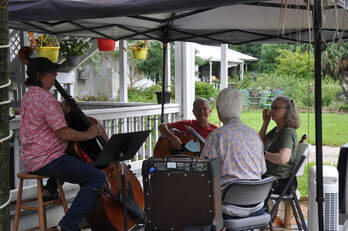 A nameless 4-piece band of friends playing outside a café in Micanopy, Florida A nameless 4-piece band of friends playing outside a café in Micanopy, Florida Then the interstates took over, bypassing all those little towns and their businesses. The towns were replaced by rest-stop businesses, franchises and company stores, owned by people far from the communities which supplied the workers who staffed them. Even then, the workers came from no single community, but were drawn in from miles away, few knowing those with whom they worked. Meanwhile, the small towns died. And now we are left with traveling through places as homogenous, and anonymous as tapioca, everything the same, with nothing left but a frantic urge to get to our destination before the indigestion sets in from yet another fast-food sandwich in one hand while the other aims the car down another stretch of highway indistinguishable from the last.  Katrina, the owner/operator of High Points Coffee & Books in Ashland, Alabama Katrina, the owner/operator of High Points Coffee & Books in Ashland, Alabama n And just like you, I have spent many a trip just droning along on the madness that is "the highway." But this time was going to be different. This time I was going to take the backroads. It took a bit of time, maybe an hour or so, to find the best way to go. There are settings on many GPS devices to "avoid highways," but don't use them. Trust me. I tried that setting on my trip back from Florida and had in interesting tour of Georgia, but didn't make a huge amount of headway on my trip! Instead, map your trip on your favorite online mapping service, then find the best waypoints to program into your car's GPS (in my case, an older, built-in Garmin). Taking the backroads added several hours to my trip, but not necessarily as many as you might expect. By going the backroads, I completely avoided the traffic jam that is Atlanta, plus a few other traffic hotspots. To make the trip even more enjoyable, I decided to break it into two days, stopping any place I found interesting, eating wherever it looked good, and choosing my stopping point based solely on when I felt like stopping.  The Town of Micanopy, Florida, where they filmed the movie "Doc Hollywood" staring Michael J Fox The Town of Micanopy, Florida, where they filmed the movie "Doc Hollywood" staring Michael J Fox Along the way I met many great people. There was the lady at the little restaurant who interrupted my placing my order to tell me, "Oh, hon, I almost forgot to tell you. It's Thursday, that means it's rib day, and we just took them out of the smoker" (I promptly changed my order). And Katrina, the owner and barista at High Points Coffee & Books where I had to stop to let a headache die down before returning to the road. The coffee was terrific, as was the conversation with Katrina and the other patrons. Katrina and her husband are from California, but now live in the Ashland, Alabama area with their 4 children. Both she and her husband are retired Navy. The coffee was terrific, as was the conversation with Katrina and the other patrons. A 4-piece band outside a little café in Micanopy, Florida was quite enjoyable, as was the deli sandwich.  A beautiful old home in Micanopy, Florida A beautiful old home in Micanopy, Florida I stopped and took photos whenever something caught my attention. The rest of the time I just cruised, the radio playing, the top down, the air conditioning blowing cool air to combat the heat. The most surprising thing to me was, when I stopped for the night or arrived at my destination, I wan't fatigued like I would usually have been. I was tired, for sure, but not that collapse on the bed and sleep for 10 hours kind of fatigue long miles on the interstate seems to bring on. If you have the time, give it a try. It takes some extra planning, but I think you'll find it's worth it. Drop a comment and tell me how your trip down the backroads went. I'll be anxious to hear.
I'm back! No, really, it's true!
It's been too long since I've been here. Over the last year or three I've moved, payed off a lot fo bills, bought and sold a few motorcycles and a couple of cars, and had prostate cancer (surgically removed). I'm even writing again. So head on over to my new motorcycle themes blog (top-right, "Ten by Two," and check out my latest mechanical project, and stay tuned to see what's been going on in my writing world.  On Tuesday, November 1st, the world lost a woman who will be missed even by those who never met her. Hannah Eimers, you were an artist, a jokester, a writer, a young lady, a role model, a friend. Your song stopped playing far too soon. Your melody lingers, the lyrics echo, the love you put into each note and word will forever be in so many hearts. We miss you Hannah. My God do we miss you. I first met Hannah as her teacher. I was a volunteer at a local homeschool co-op, while she was a young student. Always punching above her weight, she tackled assignments and topics kids many years her senior seemed to have trouble with. Her grades were excellent, and her ability to be both a silly kid and a mature young lady never ceased to amaze me. Hannah graduated the 12th grade at 15. As time went on, I became Hannah's mentor. She was a budding young writer, and we eagerly swapped story ideas and techniques, and frequently critiqued each other's work. Hannah and I also spent a good amount of time in conversation concerning our faith, and she was always ready with a tough to answer question, along with her own ideas and observations. And then, as Hannah matured into a young adult, we became friends. Being Hannah's friend was easy as she brought so much light and love into a room, you almost couldn't help it. Hannah wanted to work in film. She interned with a production company, and worked on Burt Reynolds's upcoming movie "Dog Years." Never one to be "star struck," she interacted with Mr. Reynolds and the other stars in the film as though they were simply new found friends. She even brought her pet hedgehog to the set to meet Ariel Winter. But now Hannah is no longer with us. On November 1st, Hannah passed away in a car accident. Her eyes have now beheld Him. Hers have seen the one aspect of Him that only she can reflect. She has her stone, her new name that only she and God will know. They say only the good die young, and such is certainly the case here. She did more to reflect God's Light in her short time on earth than I have done in 48 years. You will be missed Hannah Eimers. You already are... To all those who left their homes and families; to all those who watched as their father, mother, son, daughter, sister, brother, husband, or wife boarded a plane, train, or ship; to all those who did what needed to be done, even when they were scared beyond all they had ever experienced; to all those who lost a buddy, a friend, or just the guy next to them in the foxhole; to all those who received a call, letter, or telegram informing them that their loved one would not return; too all of you, a sincere and heartfelt thank you. Your sacrifice, your loss, and your courage will not be forgotten.
William K. Elliott “No legacy is so rich as honesty.” –William Shakespeare
The writing was going exceedingly well, with the words coming almost faster than I could type them (I am not the world’s greatest typist). And then came that word. It was a horrible word. It is a horrible word. I don’t exactly have the cleanest of language at times, and yet this particular word had only ever escaped my mouth in the most stressful of times. And even then, only once or twice in my lifetime. And yet there it was. I deleted it—retyped it—deleted again. For a while I just sat, staring at the blinking cursor. The more I thought about it, the more I didn’t want to use that word. I despise it. I hate it. The problem was, it was the only word that fit—the only word that my main antagonist would use. So I did what any squeamish author would do, I looked for other opinions. And in one-way or another, they all said, “use it.” Stephen King, in "On Writing" put it this way, “If you intend to write as truthfully as you can, your days as a member of polite society are numbered.” I still wasn’t thrilled with the idea. How could I be? Remember, I hate that word. Now there is only one other person I know whom I can trust implicitly and, coincidentally, who hates that word as much as I do. She is my most reliable companion, my best friend, and my support system. She is my wife. She didn’t even hesitate. “Absolutely use it,” she said, “that is exactly the word he would use." And so I did. And here’s the thing, writing fiction is an act of honesty. You have to tell the truth. I know it might seem odd that I am telling you to tell the truth about a lie of sorts—after all, that’s what fiction is, a lie, a made up story. But the ruthless leader of a violent street gang isn’t going to use the word “lady” or “woman” when he’s demanding a subordinate murder the woman. He’s going to use a vile, degrading, and violent word. And if I fail to type it out simply because I don’t like it, my reader will pull back from the story. They’ll decline to continue their suspension of disbelief, and I’ll loose my credibility. That’s why the rape scene in Stieg Larsson’s “The Girl With The Dragon Tattoo” is so frightening and violent. It had to be. If he had censored Nils Bjurman’s violence or Lisbeth Salander’s reactions, we as readers would have lost our trust in him. That’s what fiction writers do, we tell the truth. |
William K ElliottWilliam is a member of that ever-popular group known as “Aspiring Writers,” also known as “unemployed.” He has been dabbling in writing for some twenty or thirty years, and has finally decided to “get down to business.” With inspiration from Steven King’s “On Writing,” and a lot of support from his wife, Kristy, he has been working on his first novel. Archives
November 2023
|
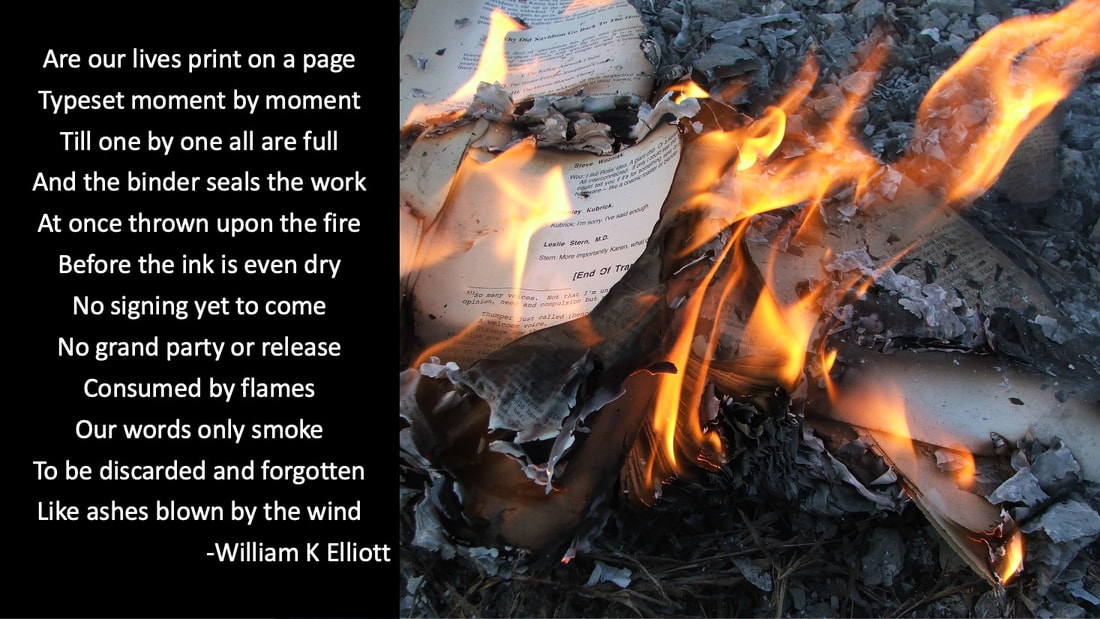
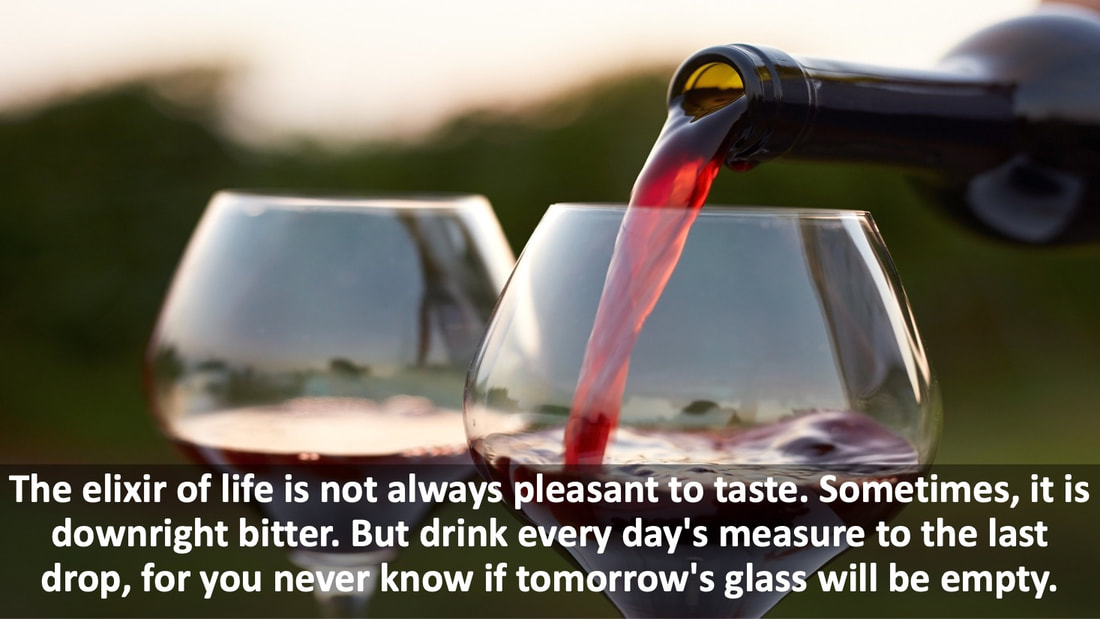


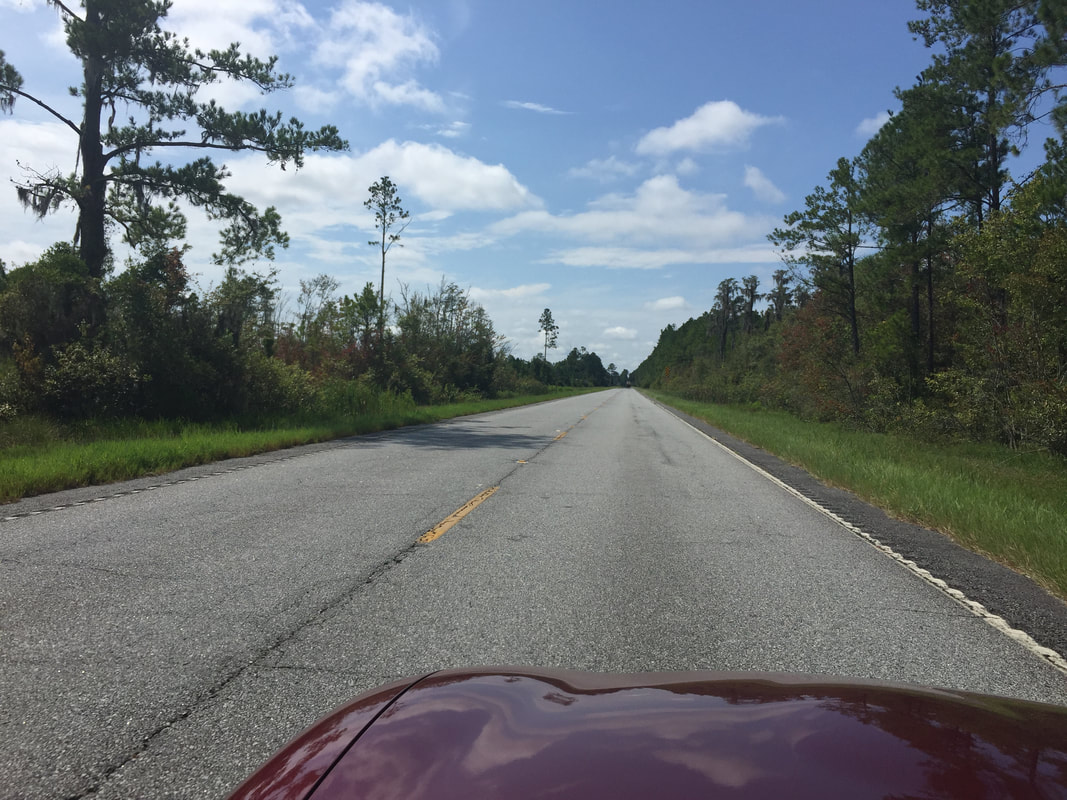
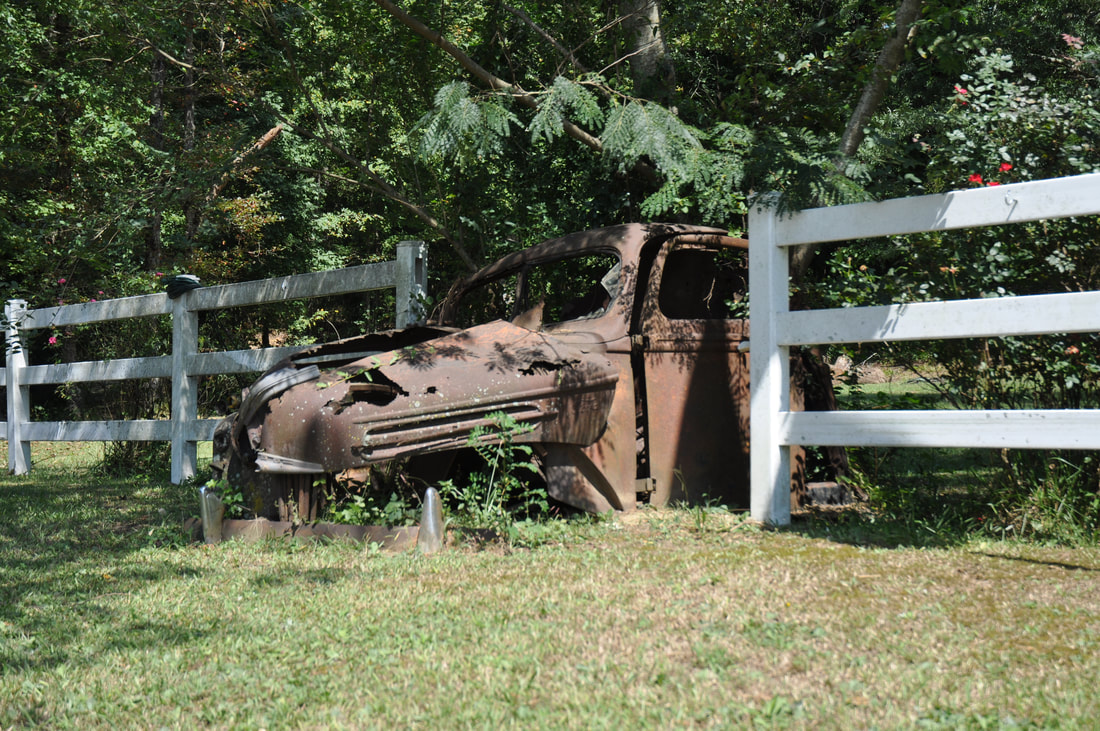


 RSS Feed
RSS Feed